ROAD TO 2021 LOCAL ELECTIONS
Above us only Sky: A road trip through South Africa’s heartland
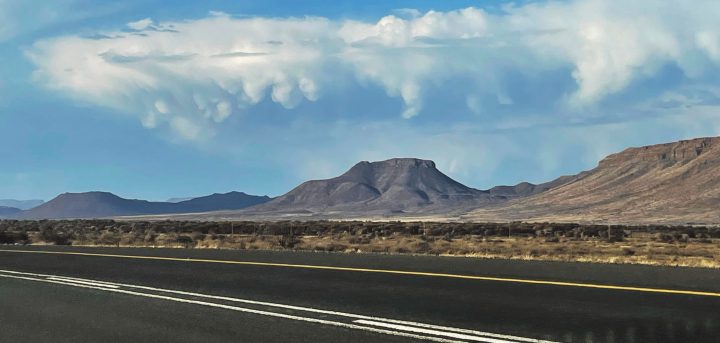
Travelling 2,000km by road through small dorps and townships, Marianne Thamm saw the effects of collapsed municipal infrastructure. Despite this, there is an eagerness to find a way out of the hole. From Cape Town to Durban, South Africans are ready in many places to do it for themselves.
It is Monday, late afternoon. Business is brisk, says the owner of the Rietfontein Padstal about 400km outside Cape Town and just off the N1 near Leeu-Gamka.
Scenes from Breaking Bad swim to mind in the sharp Karoo sunlight when a couple of deathly pale, rigid shop mannequins, dressed all in white and positioned in a rusted car wreck alongside the national highway, compel passersby to look and perhaps pull over.
We do.
They stand there, a man and a woman, as if slightly startled, frozen in conversation. A bit like the country at present.
So far, the only political posters that pole dance in the wind departing the Western Cape, snaking through the Huguenot Tunnel, passing Worcester and cutting through the sprawling Hex River Valley towards the Karoo, are those of the DA and the Freedom Front Plus (FF+). They have been busy.
It is a few days before President Cyril Ramaphosa is to announce a slide to Level 1, but here in Rietfontein, where a semi-polite Chihuahua and two other doe-eyed canines of indistinct breed loll on blankets on the floor behind the till, they have been doing okay, whatever level, thank you very much. So says the owner’s wife. Didn’t catch her name.
On the dashboard lies a well-thumbed copy of Breakthrough, a new book by ANC stalwarts Mac Maharaj and Pallo Jordan. On Wednesday I am due to interview them… From Orania. Booked a hotel with good Wi-Fi and intend to do a live webinar from the banks of the Orange River surrounded by only white people who speak Afrikaans. I speak Afrikaans, fluently. I am bemagtig (empowered), as they say in the private homeland.
Somehow, the irony of virtually smuggling Mac Maharaj into a white Volkstaat in the Free State, never mind Pallo Jordan, is too good not to look forward to. Have no idea what to expect in Orania. What I do know is no one will make me feel unwelcome.
Twilight falls and Richmond offers an overnight berth.
DA and FF+ posters bring some colour to the dusty streets. The DA is usually positioned at the top of the pole. Wonder if they negotiated this or whether the industrious DA got in first?
It is here that Len Rundle and his wife Pat moved a year and two months ago from a farm just outside Magaliesburg, where they lived. Now they run the Karoo Manor Guesthouse, Saddles Bar and restaurant.
Business is very good, thank you. Richmond is on the N1 so heavy traffic passes by.
The town has the usual well-tended NG Kerk precinct, with the only patch of lush green in sight being moistened further by a sprinkler. Outside its parameters it is dust.
In the 1800s Richmond’s mineral-rich water springs and pristine air attracted European aristocrats seeking cures for lung complaints. The springs still exist but the water that once ran freely through the sluices in the town is damming up somewhere in the broken system.
Right now, the furrows, once used by residents to water vegetable gardens, are filled with litter and sand.
Len Rundle would like to see the water running again through the town.
“When the municipality took it over it lasted three months, then it stopped running. Pumps were simply not repaired. We can take it back. The sluices. This is what makes these towns authentic. These things must work,” he says emphatically.
Richmond falls in the Ubuntu Municipality within the Pixley Ka Seme District in the Northern Cape. It is the largest of eight municipalities that make up the district, which includes Loxton and Victoria West.
It is in areas like this that Mmusi Maimane’s One South Africa movement is hoping to disrupt things by offering a way in for independent candidates who could tip a council.
Len is not interested in politicians or politics. They get in the way, he says.
He has, instead, registered a business council since moving to Richmond and hopes to begin work with the municipality to find solutions to simple problems in the town.
“This is the sort of thing I have done before. You can’t wait for someone to fix it; you must get in there and just do it,” he says.
Len is hoping the municipality will begin to work with the business council to repair the considerable damage done to the town’s infrastructure.
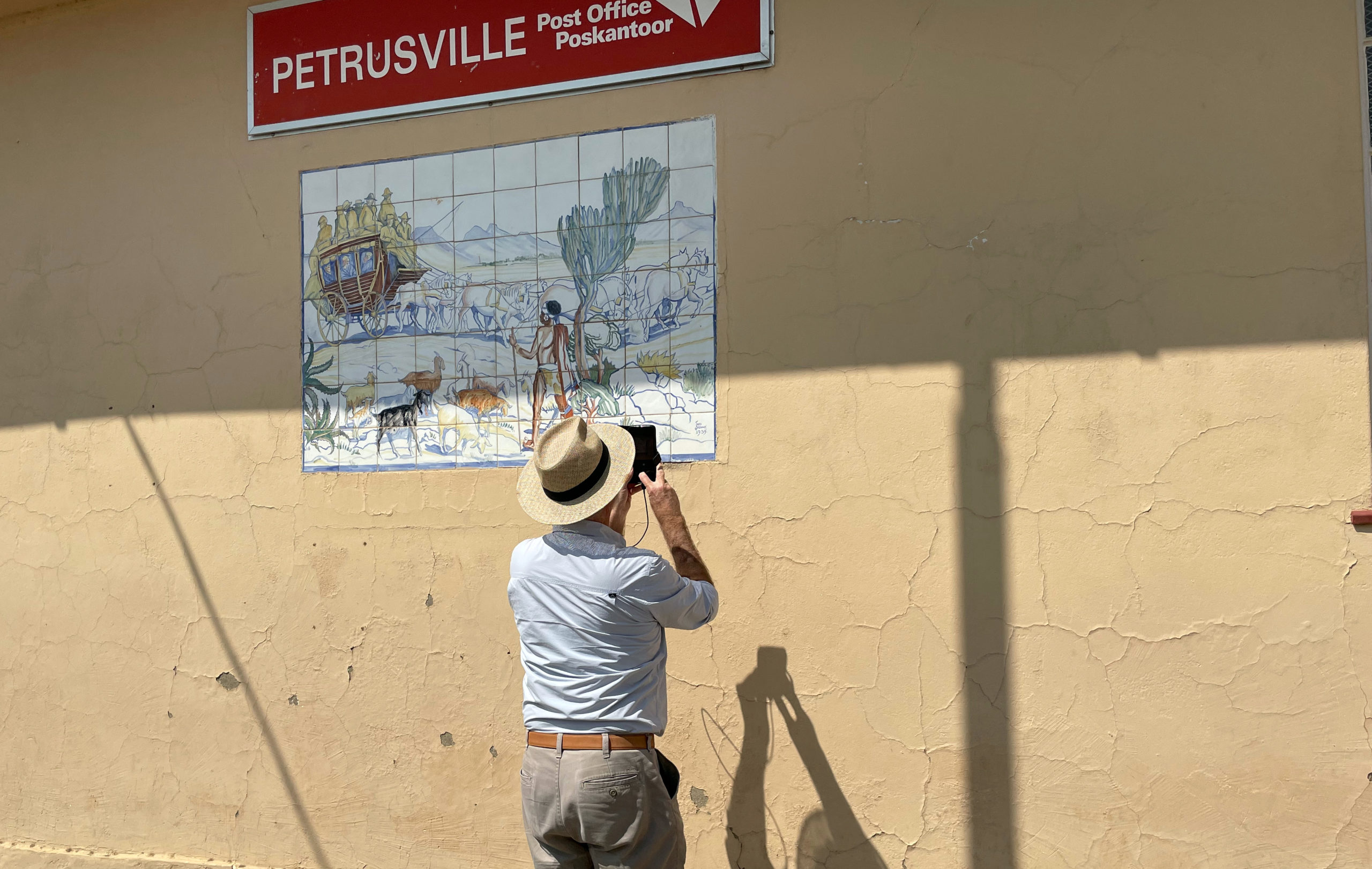
The Linnware tiles outside the Petrusville Post Office being photographed by my dear friend Bruce Hopwood, who would rather not be part of this story. (Photo: Marianne Thamm)
Petrusville, 10km south of the Orange River on the R48 and linking Philipstown to the Vanderkloof Dam, lies in what should be a fertile valley. It has an ample water supply but right now the land is hard, dry and unyielding.
Surrounding koppies host early San rock engravings and South African War stone trenches. There is hunting to be had in the area as well.
The economy of the town is reliant on Merino sheep, maize, lucerne and wheat farming. There is also the Rolfontein Nature Reserve.
More than 75% of water is supplied by a local or regional water scheme operated by the municipality, while a few residents (15.6%) rely on water from boreholes, a 2016 environmental assessment of the town found. But that was then.
In Petrusville, 92.1% of residents had access to piped water either within their houses or yards in 2016. More than 90% of the water was supplied by a water scheme, while 3.7% was received from a dam (Statistics South Africa, 2011).
“In the past, the municipality attempted a free-water supply programme to households that did not have access to water; however, in practical terms this proved to be difficult, as it resulted in a loss,” remarked researchers.
It is a traditional ANC stronghold but not a single ANC poster was to be seen. Two young women in EFF T-shirts chatted in the midday heat.
The municipality has been unable to deliver basic services to its roughly 12,000 inhabitants. The dump is a health hazard and the poor in Petrusville survive on South African Social Security Agency grants. Some find temporary employment in sporadic Extended Public Works Programmes.
Nearby Vanderkloof is a middle-class suburb/resort built around the Vanderkloof Dam. Here also the FF+ and the DA have got out of the starting blocks early. People from Petrusville fish in the dam to survive.
The small resort town is doing okay thanks to tourism and its location on the water. It is popular with out-of-town visitors.
In drab Petrusville down the drag, Kenny Kunene once played at the Convo Sports Pub in 2012. Entrance was free. Other well-known DJs who have passed through are DJ Zinhle and Prince Kaybee.
According to the 2011 census, Plakkerskamp township had 95 households, about 2,000 people lived in Thembinkosi and around the same number in Uitsig. What passes for the town had 616 residents.
On the main street farmer AB de Villiers (not the cricketer) was hastening to the neglected post office building.
Its shabby front is decorated with a tableau of tiles manufactured by the famous women’s artist collective that became known as Linn Ware, in the 1930s.
Born in Petrusville, AB hopes his sons will finish university and come back to farm.
How are things?
He closes his fist. “You see, it is like we are holding on to the water but it is running through our fingers. We are wasting things.”
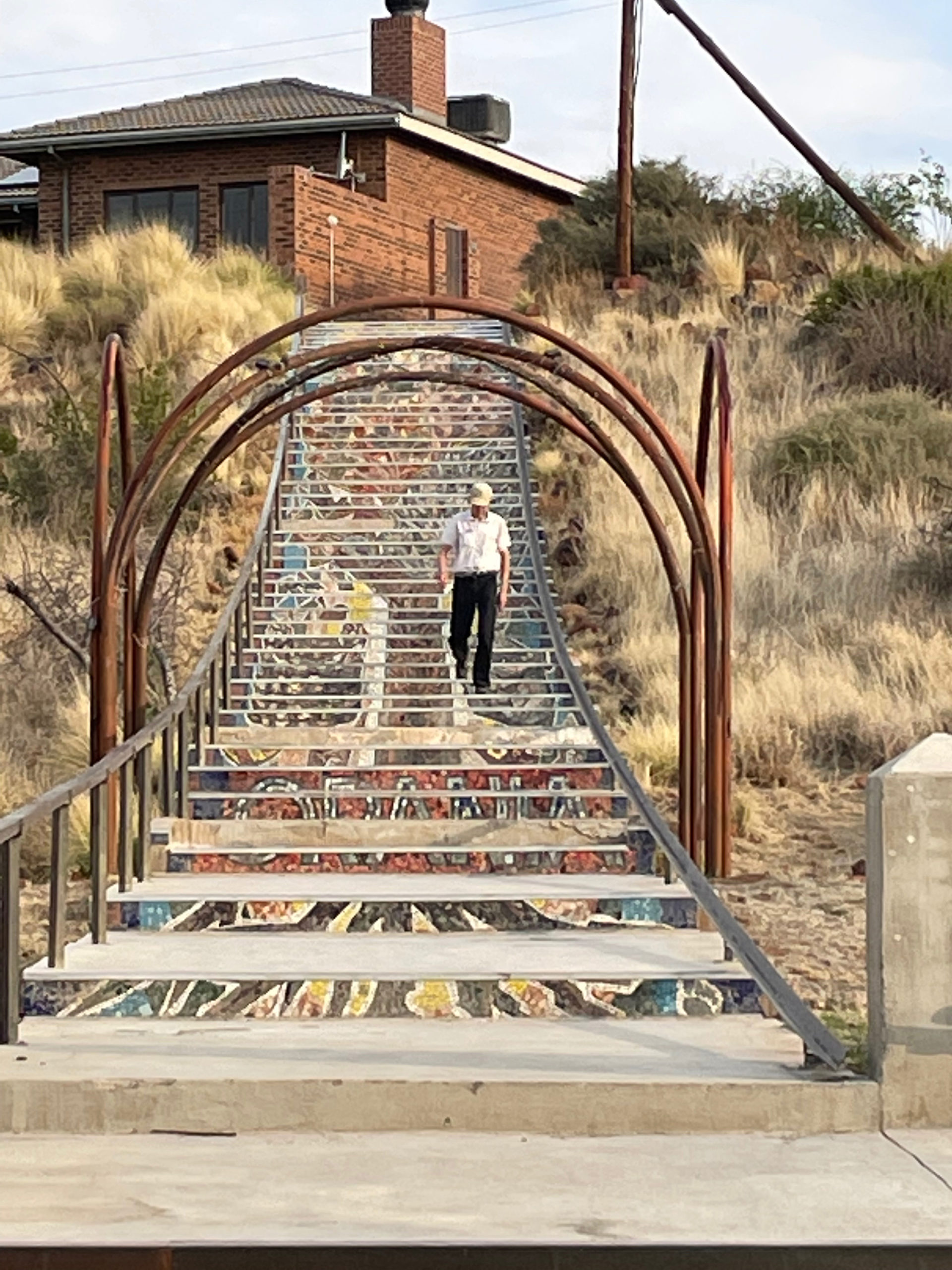
The story of Orania in mosaic steps … the roots, the tree, the heading ever upwards. (Photo: Marianne Thamm)
Orania is only about 50km from Petrusville. I am yet to finish Breakthrough. What I do know, however, is that if Jacob Zuma speaks of the “dictatorship of the Constitution” he is spitting in the face of Oliver Tambo. The revered ANC leader had the foresight to set up a committee, including Jordan, to draft a Bill of Rights based on the Freedom Charter. This is in the book – go and read it.
Speaking of the Bill of Rights … it does not apply in Orania, well at least not as far as the residents are concerned. Google Maps also tells us at this point, in the real world, that we have entered the Pixley Ka Seme District Municipality (but don’t tell the Oranians).
Orania leaves this impression.
Compared with Petrusville and surrounds, it is paradise.
Flourishing.
Pecan nut orchards, berries, straw bale houses, tourists (from SA and elsewhere, all mostly white), a neat resort next to the Orange River, fields of gold and green, an industrial area, a pipeline pushing water uphill.
Not a single black face, not one. In two days.
To understand Orania you have to follow the money. Both the rands and the ora – the cult’s own currency.
Did I say cult?
Essentially this is the ideology that underpins the entire Afrikaner Volkstaat edifice. They will tell you it is about culture, language and history, but it isn’t.
If you are a wealthy Afrikaner, Orania will bless you. You bring gifts, it gives back. Like Jacob Zuma’s ANC.
Arrive with only the clothes on your back and you will immediately be set to work. Whatever your reasons for washing up on these pristine shores, if you are working class, white, culturally identify as an Afrikaner and feel you don’t stand a chance in democratic South Africa, this is your Heimat (homeland).
Single men live in single quarters. Single mothers who arrive with children are immediately set to work and are “rehabilitated” by the Kaalvoet Vrouens – the barefoot women.
It is these matriarchs who will set you on the path to Christianity, the restoration of your dignity and your Afrikaner pioneer identity.
Arbeit macht frei. Look it up.
If you are approved as a “resident” you might be given a R50,000 loan from the OSK Koöperatiewe Bank Beperk, Orania’s cooperative bank.
Our tour guide tells us that new residents sent out to work immediately are expected, when they arrive back from digging ditches, cleaning toilets or building houses, to build their own houses.
There they are.
The pile of bricks and other materials have been delivered to your patch of earth. You want freedom (well, our version of it)? Then work for it.
Your modest salary will be paid not in rands.
Those are invested where rands matter. In the Republic of South Africa, where they draw interest.
In Orania you will be paid in oras you can only use in Orania. If you want to withdraw your rands, you pay the bank for the pleasure. You sign up for this, all legal apparently.
The ideologues of Orania say they want Lebensraum (living space), they want self-determination and to be able to live alongside neighbours in homogenous racial harmony. The workers are there just to survive in a world far away from what they perceive to be a false freedom in the Republic of South Africa.
Here, on this tiny patch of earth, split by Highway 680, hearts can soar, while the body sweats.
Orania receives nothing from the state, or so they say.
The private town supplies electricity it buys from Eskom to its residents. It has its own fit and trained private security force, who train every day in a gym. It is they who deal with “issues” in the Volkstaat.
Life here can be costly, one more affluent resident confessed, but not having to fork out for private security leaves a lot more to spend every month on education.
Orania has its own Volkskool where the children of those who arrive destitute are shaped into good Afrikaners. About 2,000 have settled and they keep coming.
“You can’t help the adult sometimes but you can work on the children,” remarked a resident.
“Can black people visit and sleep over?”
“They can, but they don’t really feel comfortable,” said our guide.
Tourism is booming, the town is bursting at the seams. There is a lot to see and marvel at. For sure.
And it looks impressive compared with those bits of South Africa that surround it, broken, poor, struggling. One can admire the determination to be self-sufficient, the innovations in energy and farming. But Orania is ultimately a nationalist, capitalist kibbutz guided by the ideas of a cult of austere “freedom-loving” ancestors – Kruger, Steyn, Hertzog, Malan, Strijdom, Verwoerd, Vorster.
Of course, Betsie Verwoerd’s home has become a shrine. The widow of assassinated prime minister Hendrik Verwoerd lived out her golden years in the small home, which appears to be precast and made of asbestos and concrete.
In Orania, there are no election posters sullying the horizon.
If you want to understand Orania and the mindset that underpins it at the core, the Verwoerd memorial house will reveal it.
In 1995, Nelson Mandela came to drink tea with Betsie. The visit made world headlines for obvious reasons.
Yet nowhere in this museum today is there a single photograph commemorating this significant act of grace and forgiveness.
It simply does not count among the treasures that those who care for the collection believe should be housed in the tatty museum.
Verwoerd’s suit and shirt he wore the day he was stabbed to death in the National Assembly are there, as is the blood-splattered chair he sat on when he was shot in the head by David Pratt in an earlier assassination attempt.
On a hill overlooking a town are the busts of those the town considers Afrikaner political heroes.
Marthinus van Schalkwyk didn’t make it, although the “little giant rolling up his sleeves” – Orania’s emblem – could be mistaken for “Kortbroek” looking for a fight.
In front of a hefty bust of Verwoerd someone has carved “Flufy” in the red stone.
The interview with Mac and Pallo goes off relatively smoothly, apart from one sudden disconnect from the hotel’s Wi-Fi, which I do not want to suspect was related to someone overhearing the interview, conducted from a small wooden stoep. Just outside, a few minutes earlier, two burly white boys arrived with buzzing saws to cut down a huge tree blocking the solar panels on the roof. It was done and dusted in record time. The persistent wheeze of a leaf blower too, I suspected, was an act of potential sabotage.
Exiting Orania on the highway bypassing Bloemfontein and leading to Brandfort, it is thrilling to see signs for Bram Fischer International Airport and Kenneth Kaunda and Nelson Mandela Drives on the highway to the town to which Winnie Mandela was banished in 1977.
Free South Africa … sad, but free and on the brink.
At least one municipal worker has been electrocuted to death in Brandfort. As was Frans Posthumus’s grandson when he touched a live wire running down a pole in Voortrekker Street. It was captured on CCTV.
Posthumus has documented the abysmal state of the town’s electrical supply. Compiled an entire dossier with photographs of every single pole and substation, every logbook gathering dust, evidence of little or no maintenance.
In the dossier to the municipality and various lawyers and politicians, he notes how a Masilonyana Municipality electrician “electrocuted himself to death at the substation where equipment was destroyed and not replaced, and in the process, a critical switching gear breaker was destroyed and has not yet been replaced – it is bypassed with a cable”.
Instead of reticulation, equipment and infrastructure, homes were now being protected by a 200-amp circuit breaker; electricity was directly connected to the 600-amp Eskom supply system.
Brandfort’s outstanding debt to Eskom is about R85-million.
The ANC-led municipality now hopes to install prepaid meters, a decision that has caused widespread unhappiness and will no doubt feature as an election issue.
The DA and the FF+ are up the poles in Brandfort. Still no sign of the ANC or the EFF or anyone else. But it is early days.
In Posthumus’s report, which he compiled with the help of the town’s former electrician, Johan Swanepoel, he noted that a subcontractor in his 70s “keeps the whole of the Masilonyana (Theunissen, Winburg, Verkeerdevlei and Brandfort) electrical maintenance afloat”.
The grandfather is determined, alongside other residents, to take on the municipality and to keep sending reports to whoever will listen and take action.
It was Winnie Mandela who put Brandfort on the world map and while the Department of Sport, Arts and Culture has spent millions renovating the home, 902 Mothupi Street in Majwemasweu Township, it stands empty, unvisited, unloved.
The entire area is devoid of any trace of Winnie Mandela.
On the day of our visit a marquee that had been erected in a dusty field opposite the house was being taken down. Three attempts by the ANC to rename Brandfort as Winnie Mandela have failed.
National road signage outside the town where the name change was due to be unveiled have been defaced with spray paint and covered with black plastic and masking tape.
Winnie, once again, through no fault of her own, has become a political football.
Promises to try to stock the house with artefacts and museum pieces have been repeatedly made, but nothing has materialised. The only sign of life is the two young township residents who have been employed as security guards at the historic site.
That the town could simply rename itself “Brandfort – Home of Winnie Mandela” seems not to have occurred to anyone. It is a win-win. The shame of the town and the legacy of Winnie celebrated at the same time.
The museum, if run well, could provide a huge economic boost to the depressed and nonexistent township economy.
Regardless of where some may place Winnie Mandela in a pantheon of heroes and villains, she earned her place in South African history. To ignore her in this fashion is emblematic of a governing party preoccupied with money and power.
Brandfort is in trouble, one way or another.
A short stop at Winburg and the Voortrekker Monument is required as part of a trolling mission of lawyer Richard Spoor, who “accidentally posted” on Twitter a posed photograph of himself naked from the waist down sipping his early-morning coffee. A man who sticks his dick in the nation’s face so early in the morning deserves a week of trolling.
Winburg is a dump.
Literally. Surrounding the town are piles of fetid disposable nappies and other unidentifiable rotting matter. Even along the road next to the graveyard the dead must rest among the debris.
The design of the Voortrekker Monument is by Hans Hallen and M Dibb of Durban, who had submitted, in the eyes of those erecting it, the most suitable design when it was built in the late 1960s. It was inaugurated by President Fouché in 1968, but no one really remembers any of this now.
Phallic stone turrets thrust forward from an austere slab pointing heavenwards. It is here I pose for my Richard Spoor coup de grâce.
From the bushes a man emerges. Introduces himself as Jakob. He only speaks Afrikaans.
“Do you own a farm?” he asks urgently.
He is unemployed and desperate. The politicians have stolen everything, he says. He asks for nothing.
I ask if I can help and when I do, he falls to his knees in the dust and cries before looking up at the sky. It is a profound moment of shame and humbling.
Free State – what is there to say?
Potholes all the way before Ficksburg heading towards Clarens.
Thousands of them. In some places the roads between small towns are as bad as Mozambique after the war. Here and there it is mush and mud, thanks to Free State rainstorms.
Then it is our turn.
In a dark and brewing electrical thunderstorm we hit a Free State crater, buckling the rim and shredding the tyre, beyond repair.
The spare will not yield from its casing under the vehicle. An unforgiving bolt on tight. Help arrives from Ficksburg about 30 minutes away, where the tyre business is booming, of course.
Branches all over the main road. R1,700, just like that. That week it is announced that Sam Mashinini, the MEC for Police, Roads and Transport, has been fired. I feel like sending him the bill.
The roads are like this because rail has collapsed. Rail has collapsed because everyone stole from Prasa until there was nothing left to steal.
Not a single train to be spotted the entire 2,000km journey. Just trucks, hundreds of them, trundling across the country, churning up roads. Grinding us to a halt.
Everywhere people are looking for solutions. Their hope, in this time of deep trust deficit, lies with many, in electing independent candidates. If that doesn’t work, businesses are going to band together.
We will have to wait and see.
We soon cross into KwaZulu-Natal. Huge queues and holdups at toll plazas. Sanral must be making billions.
Few signs of the insurrection along the roads remain, apart from a few burnt-out warehouses. But it isn’t over yet. The bloodshed in KZN is here to stay for a while, everyone has warned.
Preparing to fly back to Cape Town, Johnny Clegg’s autobiography, Scatterling of Africa, drops into my inbox.
It is a call by an ancestor who loved us to relook who and what we are in all our diversity and to harness the talent, determination and grit that has got us this far. Roll on elections.
Because if we don’t do it together, nobody will. DM168
This story first appeared in our weekly Daily Maverick 168 newspaper which is available for R25 at Pick n Pay, Exclusive Books and airport bookstores. For your nearest stockist, please click here.
[hearken id=”daily-maverick/8761″]




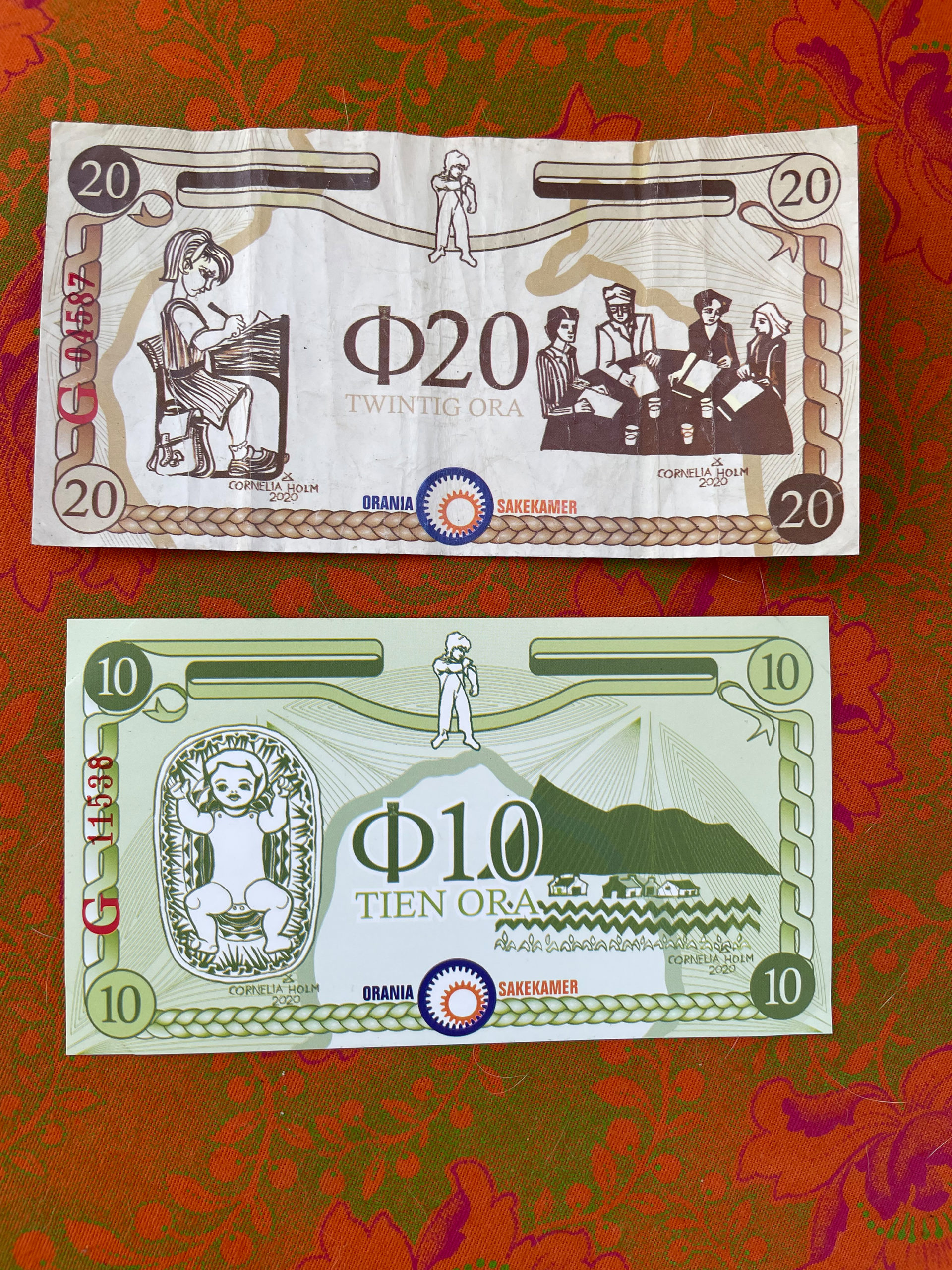
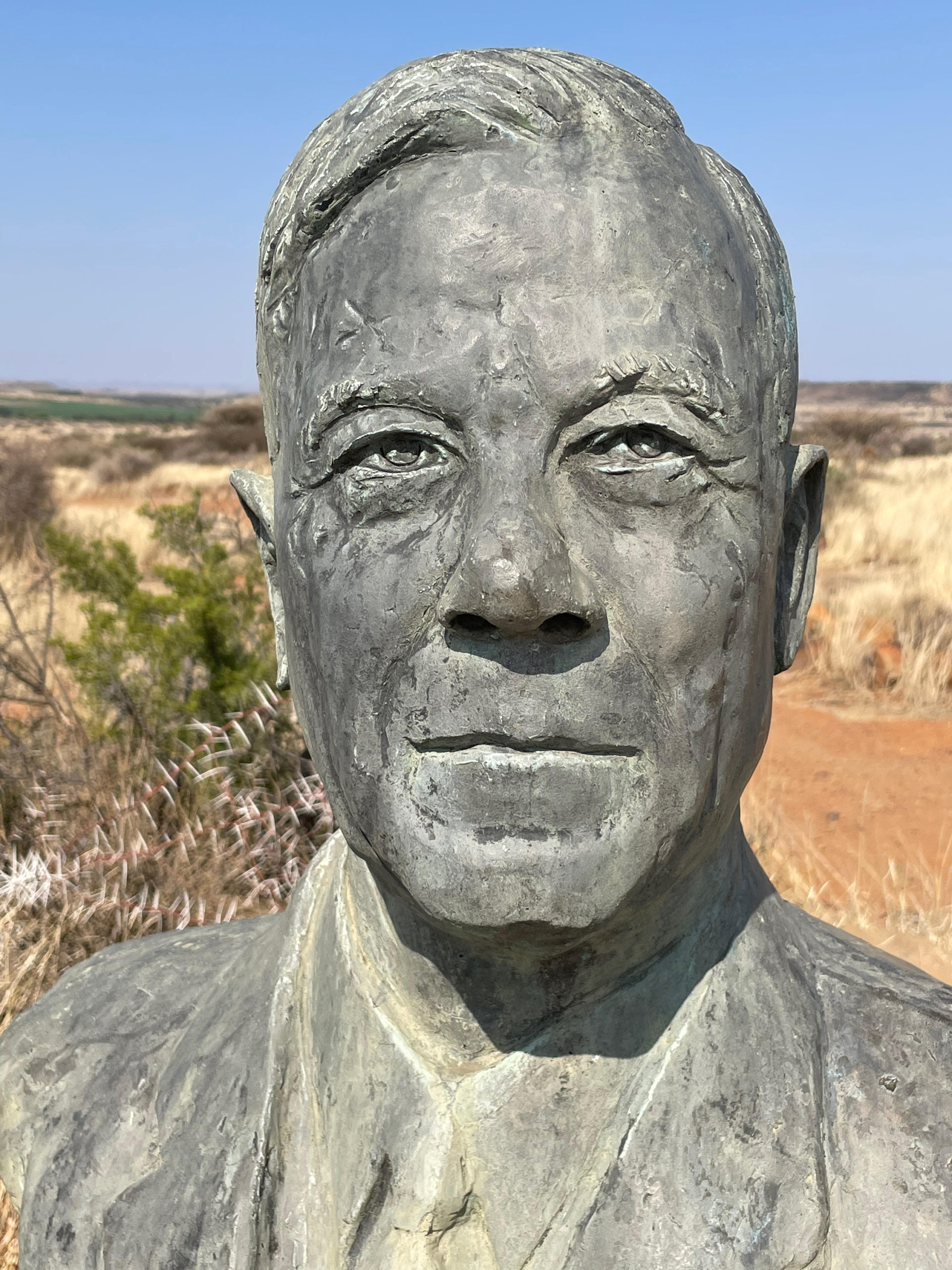

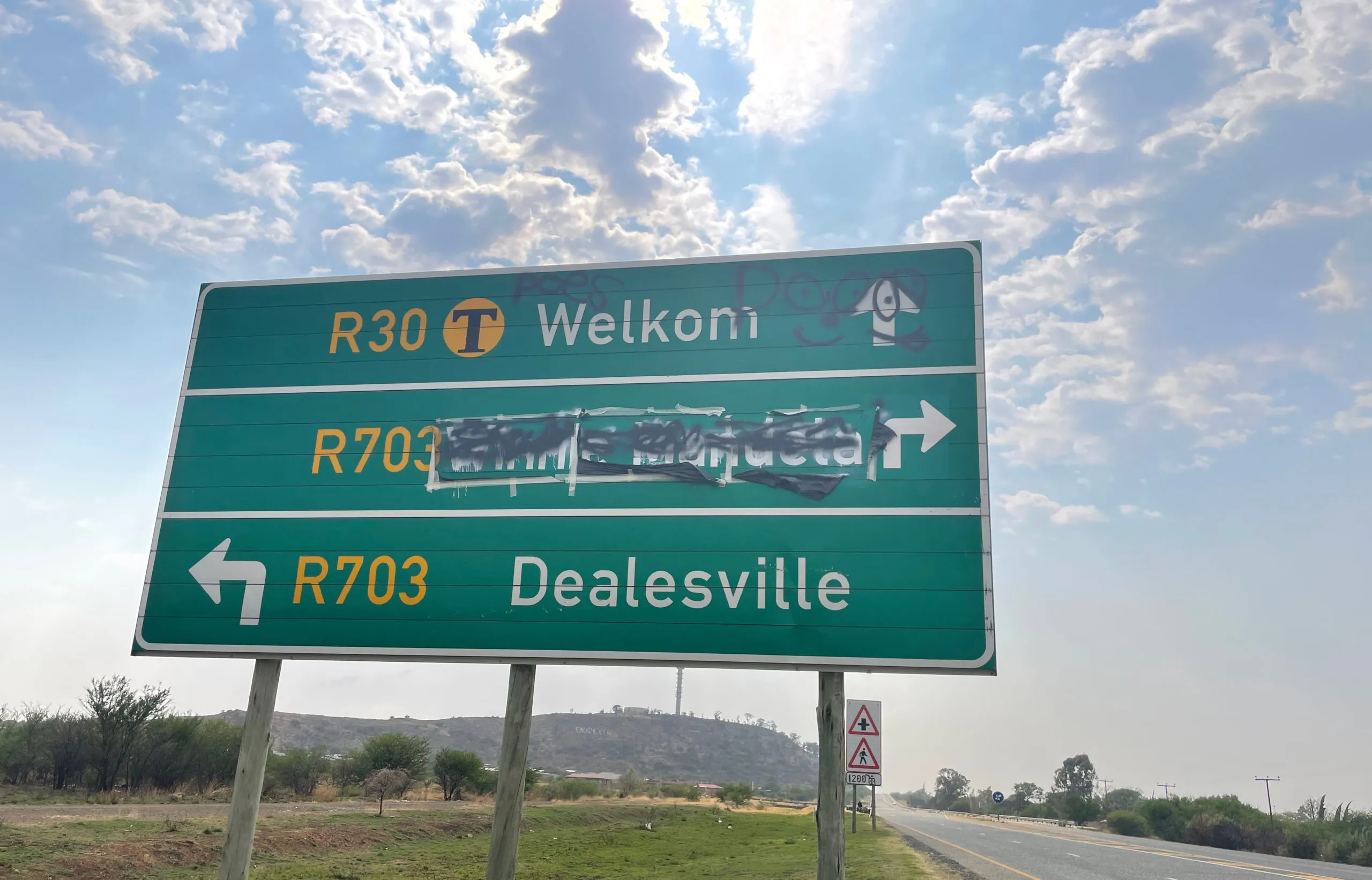
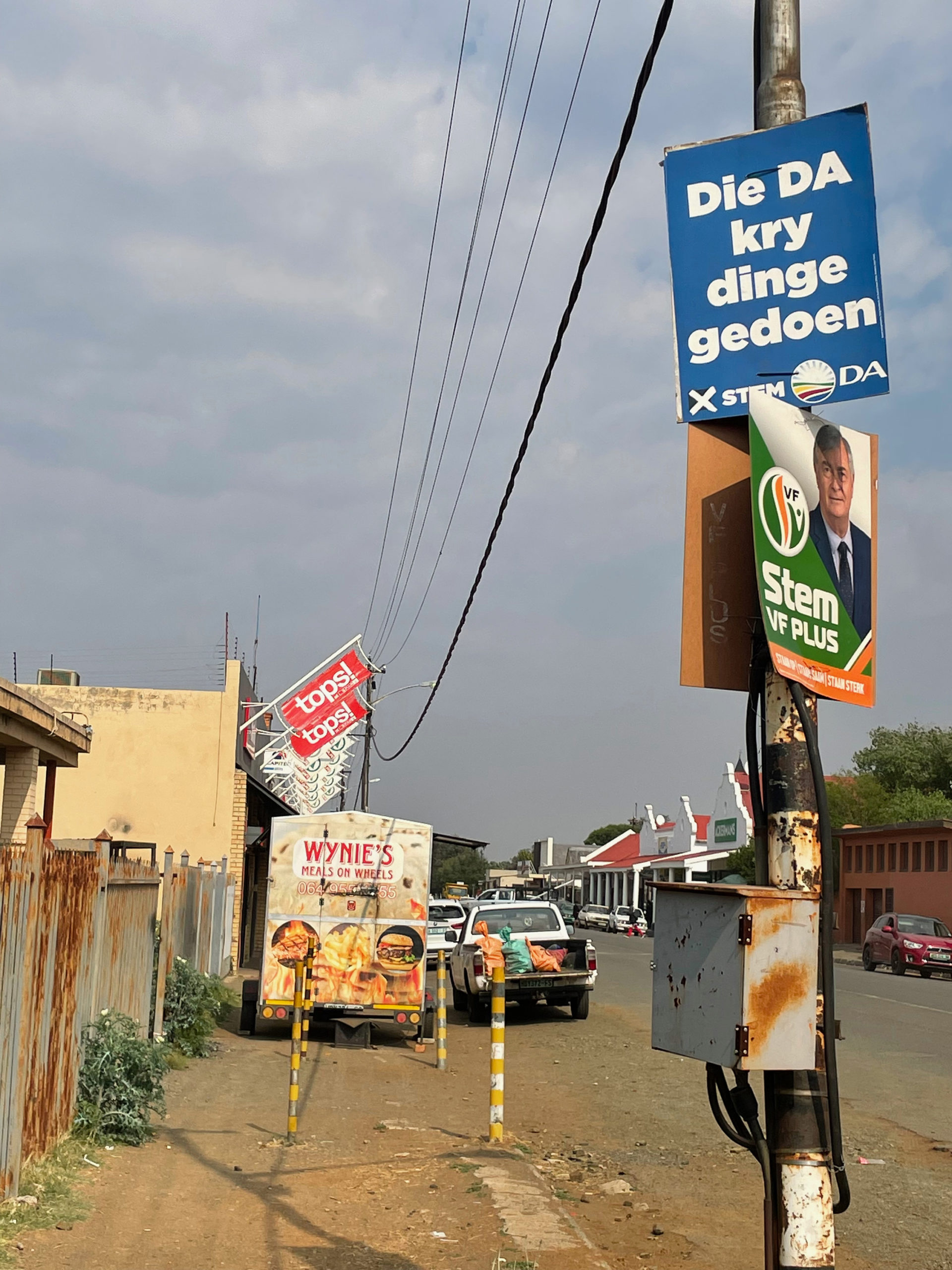
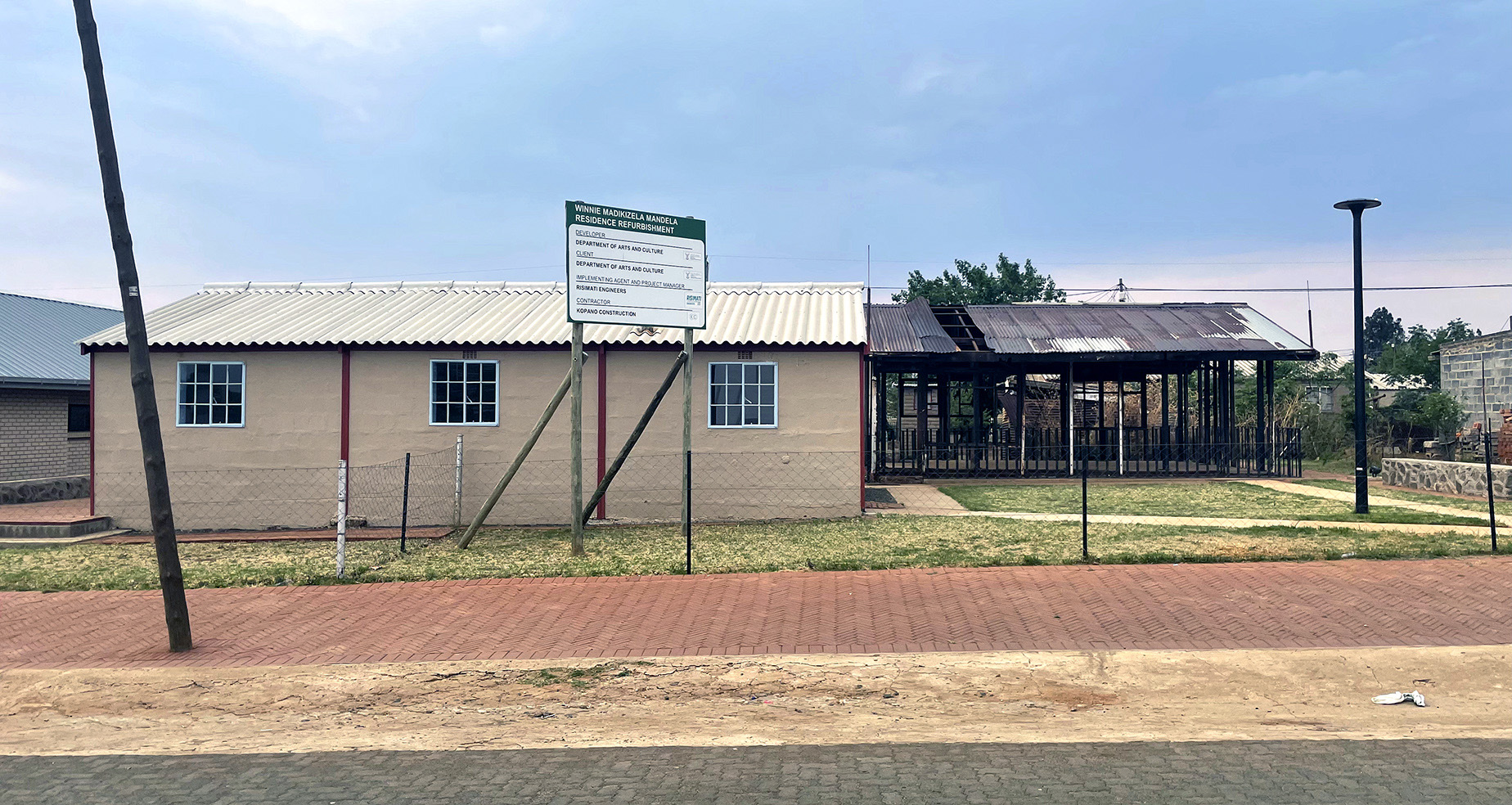
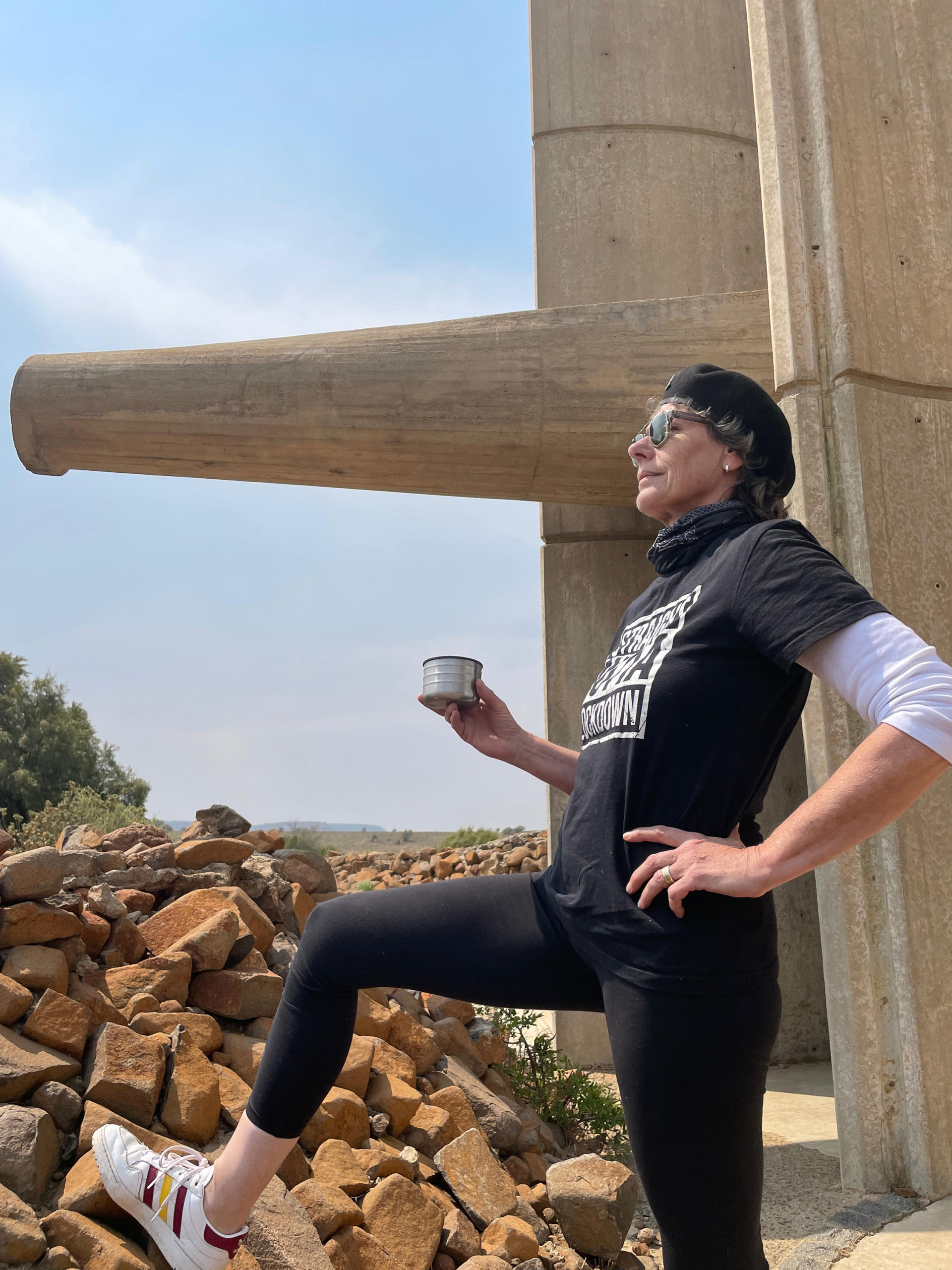
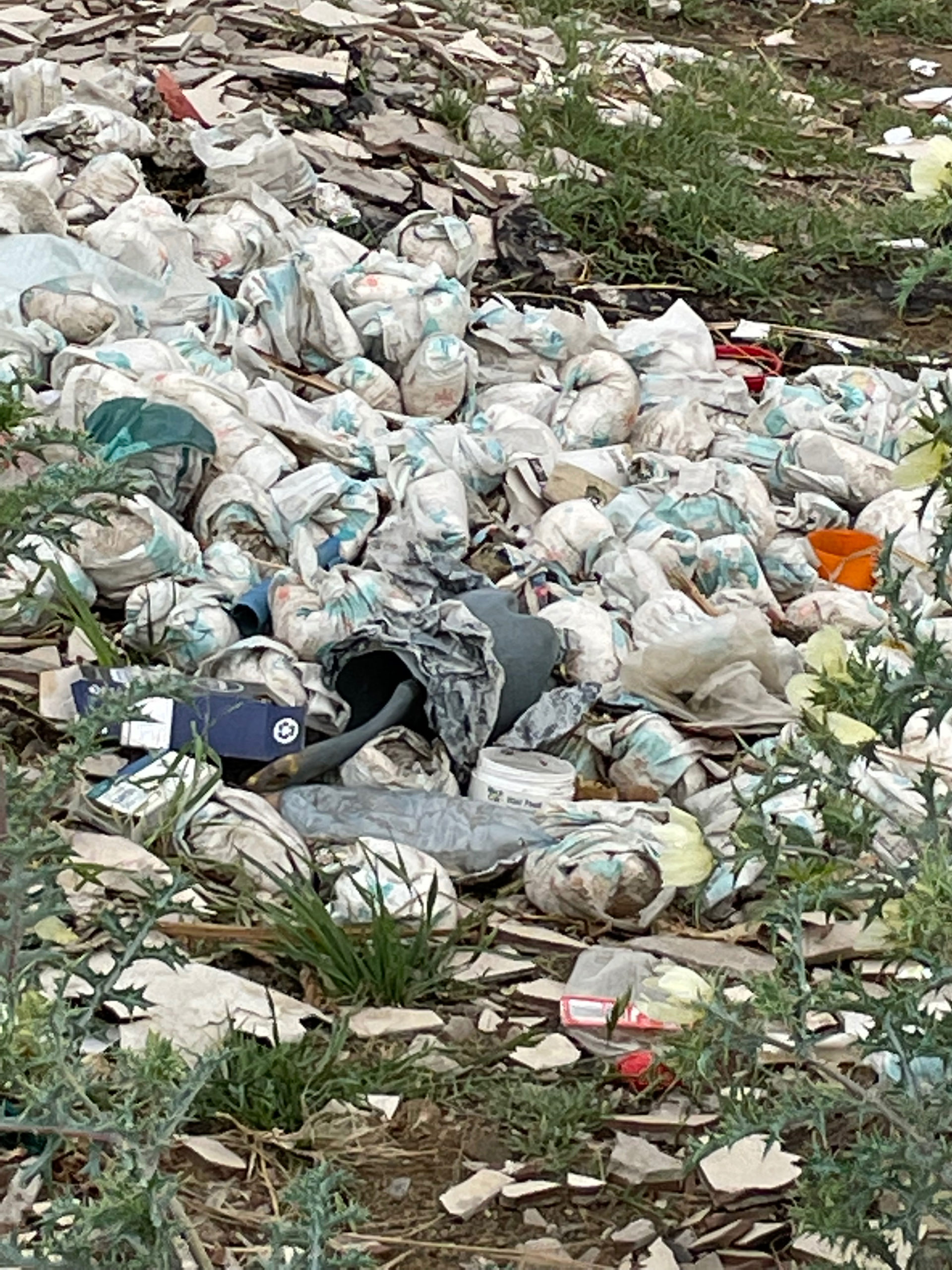
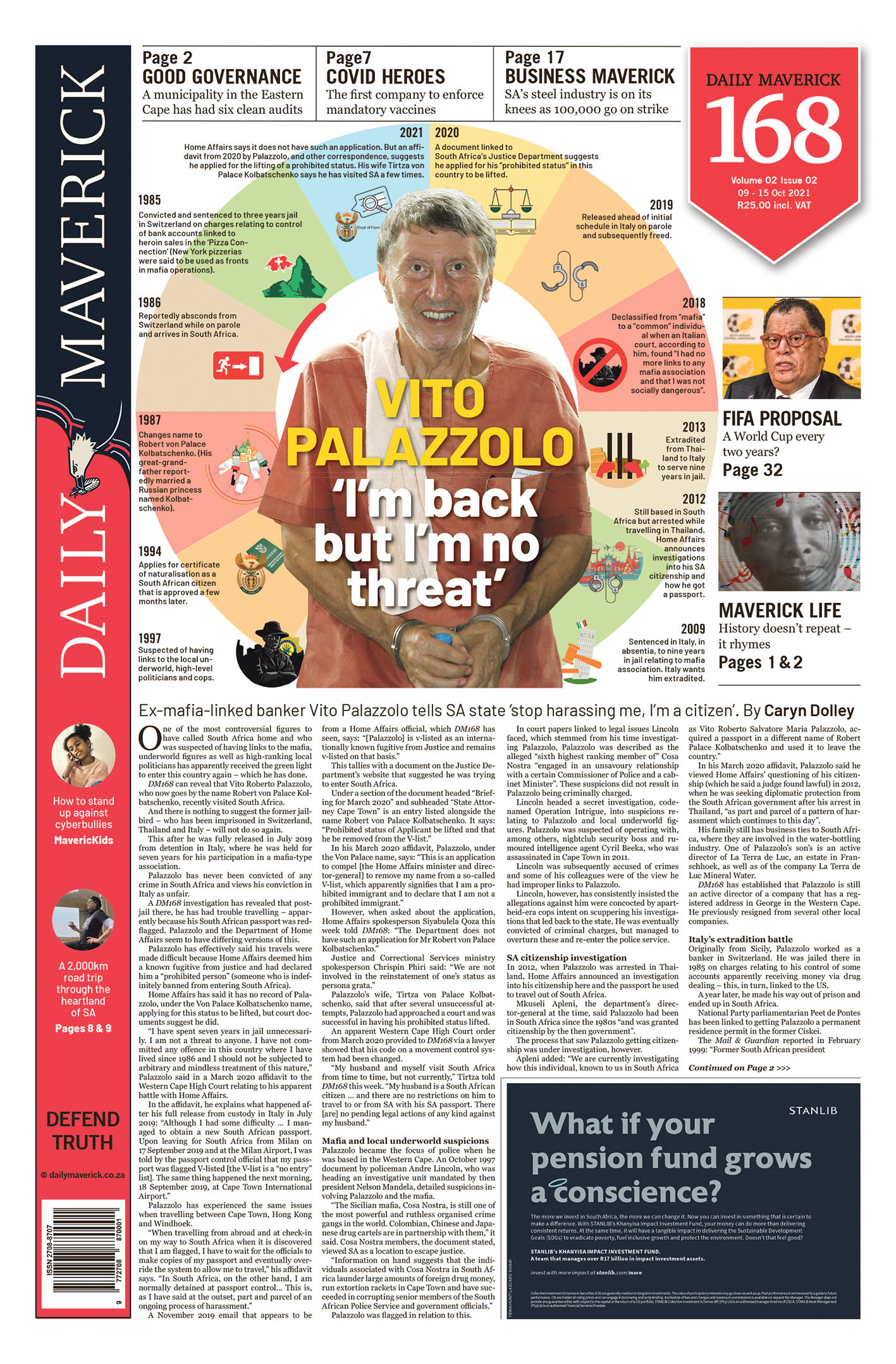



















 Become an Insider
Become an Insider
Nice read. Thank you.
Agreed. Thoroughly enjoyed it.
It seems to be standard practice for DM authors to report on Orania in a dismissive, even sneering, manner: the cursory, obligatory mention of the positives, and a lot of dwelling on the (shudder!) Verwoerd museum, the statues, the perceived negatives of tribalism and “selfwerksaamheid” (to quote the author: look it up). This time we were even treated to a conspiracy theory of suspected sabotage!
How refreshing it would be to have an analysis of what the greater South Africa could learn from Orania: the benefits of putting destitute people to work and fairly rewarding them for it, the benefits of education, of security, of creating a common identity and pride, of the economics of building local wealth instead of enriching already rich global competitors (remember the financial Rand?), of planning and goal-setting and then actually executing the plan, of perseverance against the odds, of adaptability, of an “‘n boer maak ‘n plan”-attitude, and so much more.
Sigh.
I read this article before I read the comments and did not detect any sneering at all. The ” look it up”s encourage us to look into concepts and think about them, not ignore them.
I think Ms Thamm just describes what she sees, and is frank about Orania being in better shape than anywhere around it.
Yes, but then she compares Orania with what happened in Germany during the Second World War ‘Arbeit macht Frei’. As far as I can ascertain not one inhabitant of Orania is there against their will.
Nah. I don’t agree. There’s no comparison – there is no reference at all – it is written in it’s own paragraph and she doesn’t even put it in quote marks. I hope that your comment above isn’t your only takeaway from this, IMHO, brilliant piece.
No, it isn’t. Thoroughly enjoyed it.
I agree with the positive comments from Mr Jansen van Rensburg…perhaps the ANC should take a leaf out of Oranias book, stop stealing from the tax payer and create a similar structure for the homeless and disenfranchised people of South Africa. The dignity that human beings have, comes from being able to help yourself…not from free housing, Gov. Grants and theft. Every person in this country deserves dignity – every government has a duty to assist with this. And every tax payer deserves some value for their contribution. Get these three things right and South Africa could be a role model for the rest of the world!
Have to agree that the author quoting from the Nazi death camps is a bit much.
I am no fan of ethnic or cultural isolation, but the people of Orania pulled themselves up by their boot straps in a pretty unforgiving tract of land. So what if they want to live with their own. No different from a Rastafarian community, a Mormon community, Jewish or Muslim community. Yes, they have some pretty strict rules and doctrines, but the fact that they are able to offer work and shelter for any destitute Afrikaner is noble.
The Nazi references are an insult to the millions who died in the death camps. DM should be ashamed of itself for publishing such sentiments.
I agree. Totally abhorrent
I agree. The Nazi references are disgusting. From my side there is a certain sensitivity as some of my grandparents had to endure that period of Europe. Trust me Orania is in no way similar.
DM journalists when they do comparisons always try so hard to be hip, to be seem as cool.
Orania might have a strict work ethic. The ANC and the rest of SA could take a few lessons.
I’m not Marianne, but know she is of German decent, and as such too, I share that experiencing a place like Orania could well make us extremely uncomfortable, even nauseous.
It’s a factory-setting response of deep shame and disbelieve for post Nazi Germans (overwhelmingly), and I read her references also in this connection, and in this context.
You will know better than most then, that “Arbeit Macht Frei” was used in the Nazi concentration camps, where Germans were putting Jews to work until they expired. Don’t forget that the prisoners themselves apparently added the words “durch Krematorium nummer drei” to make it into a macabre rhyme.
So, “Arbeit Macht Frei” was about one race working another race to death in slavery.
Here’s the thing: in South Africa, Orania is the only place where that does not and cannot happen. It is in the greater South Africa where, even today, a sizeable portion of the black population has no option but to work as servants and manual labourers in the employ of whites (and other races, of course). But not in Orania.
So, “Arbeit Macht Frei” is possibly more appropriate to describe the status quo in South Africa, but most definitely excluding Orania.
Here’s a little worst-kept secret for you: I believe that many white South Africans would love to live in Orania for its security, cleanliness and good governance, but they don’t do so because they cannot have servants there.
Oh, the gut-wrenching irony.
I hope that I have clearly illustrated the absolute inappropriateness of Ms Thamm’s use of the phrase in the Orania context. If not, perhaps I have give you something to ponder while you struggle through your ancestral mea culpa.
Thank you for sharing this journey with us. I have recently done a similar journey and my experience mirrors yours….very grateful that I’m not alone in my disappointment and shame at what could have been. This country has so much potential – wonderful weather, lovely people, opportunities and bright minds – sadly it’s the political leadership that has wrought its destruction and is testing the bounds of our Constitution. One can only hope this holds firm.
Lovely article Marianne. It is gems like this that make our support for Daily Maverick so worthwhile. Bruce Danckwerts, CHOMA, Zambia
Brilliant piece. I love traveling SA on my BMW bike and visiting the museums and churches of the towns I visit. We live in a great country. I won’t live anywhere else.
Thoroughly disheartened by this, despite the glimpses of blue sky. So much to be done and undone.
Have enjoyed, Marianne, to accompany you on your travelling through the highs and downs of some S. A. areas with different sizes and depths of physical, social and political potholes. From my German perspective your views on the state of some obviously typical municipalities as the basic livelihoods of S. A. citizens do not really encourage to believe in the future of the country. Orania seems an island in the ocean of increasing despair. Will the upcoming elections show a wayout?
Great article. But, sadly, so depressing.
Citing Arbeit macht Frei as a dog whistle to call attention to Orania’s insistence on racial purity in who they permit to live there is a big stretch and somewhat beneath the writer.
What is pretty clear is that the ANC has acheived something pretty remarkable in small towns around this country: they have reversed the gains of civilisation. Roads replaced with holes; running trains with trudging pedestrians; electricity with candles; administration with absent, callously indifference officials.
A very sensible comment. Perhaps CR and his cabinet need to be taken on a similar trip and in each town be forced to clear up some of the mess by hand.
Excellent article. Sometimes depressing to have the state of the nation revealed, but there is a necessary truth being told. Having spent less than a year in South Africa in the last thirteen years, I feel quiet optimism that this is not a hopeless country.
Well. I thought it was a good read and so accurate. When you see, as we just have on a long road trip, the state of the local municipalities and roads across the country, you want to weep. Sadly, I don’t know that any of it is salvageable.
Poignant indeed…thank you.
A good read , summoning so many ghosts of previous road trips through the heartlands ofSouth Africa- these little towns that might have been sleepy, but generally were wellkept, had water and electricity, passed through by many trains. The most telling thing here, as the author says, is the complete absence of any train- destroyed , looted, gone with the compliments of the ANC! It is all so weird and nostalgic for those of us who remember things as they were.